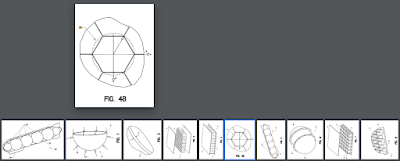SF Books Singletons in a Series
So, continuing with what I've read this year. Some brief comments on each, as I find I'm not one for writing in depth reviews.
Book 8 of Alex Benedict series.
I'm a big fan of McDevitt's work, and his A Talent for War comes highly recommended by me.
Octavia Gone was better than the previous book released in his other series, but I kind of feel that the series has lost steam. Though I could be wrong.
If you're a fan you will likely enjoy this. If not, it depends on whether or not you like archaeological mysteries set in the far future?
 Monster Hunter Bloodlines by Larry Correia
Monster Hunter Bloodlines by Larry Correia
I've been hooked on this series since I read Monster Hunter International.
Eight books in and all the plot threads are coming together.
For those who hate Larry, I don't care. Like John Scalzi, his online persona is one thing, and face-to-face another. I found him charming, and his wife Bridget is lovely.
Besides, guns, monsters, more guns, more monster, world ending events, all written with humour that makes these a fun read.
This is book 15 of the series that I reviewed here. Of course we had to get the book that ties up Skippy and Joe and his merry band of pirates story.
The series as a whole is a little padded out, and a lot of the fans thought the ending felt flat. I on the other hand thought the ending was the best it could be given the set-up.
Once you've saved the galaxy any sorting out of loose ends up is everything is going to feel flat. However, there's new book out, so we shall see where the story goes next.
 Alliance Rising by C. J. Cherryh
Alliance Rising by C. J. Cherryh
An Alliance–Union universe novel.
Rimrunners is my favourite in this long running series. Each novel tends to be a standalone that adds to the richness of the universe. All the stories are snapshots of particular events that lead to Malazan and the Company War.
This is the story of how the balance of power between Earth, the stations, and Cyteen changes, which sounds a bit blah, blah, blah, but really isn't.
 Oddments (short stories) by Marko Kloos
Oddments (short stories) by Marko Kloos
This is a collection of Kloos's short stories. I love his Frontlines series and must at some point try his Palladium War series too.
My copy is from the first print run and lacks the table of contents, which makes it a super rare collectable (at least in my fevered imagination).
I have the new Scorpio Frontlines: Evolution arriving soon. So this is a series I recommend.
 Memory's Legion (short stories) by James S. A. Corey
Memory's Legion (short stories) by James S. A. Corey
What can I say about this series that hasn't already be said? Probably nothing.
This is a collection of all the short stories that add different perspectives to the various reveals in the main novels. Answering questions like what happened to Nagata's son? What the future holds for Amos?
A must read for all fans of the Expanse series.
 3zekiel (First Contact) by Peter Cawdron
3zekiel (First Contact) by Peter Cawdron
This a series that isn't a series in the conventional sense of a shared setting and continuing characters, but rather a one that explores various first contact scenarios.
Both this and Clowns really gripped me, and I want to read a bunch more of his novels in due course.
A part of his Humanx Commonwealth series: Midworld; Cachalot; Nor Crystal Tears; Voyage to the City of the Dead; Sentenced to Prism; The Howling Stones; Drowning World; Quofum.
This is pretty much a standalone story. One could see how this story along with Call me Joe by Poul Anderson, may have inspired Avatar.
Foster is not noted as a great prose stylist, but he can sure spin a solid story. His ability to weave plots is second to none.Classic old school SF.
 Probability Moon by Nancy Kress
Probability Moon by Nancy Kress
First book of a trilogy.
Yeah, not sure about this. It has promise, but it's the first book in a trilogy, which I haven't been able to get copies of to finish reading.
So colour me cautiously optimistic that I'll enjoy the rest as and when I get copies.
SF Standalone Books
Okay, David Drake died this year, which prompted me to pick up and read this.
I think it's better than his Hammer Slammer series. Strong words when you think about the love and esteem that fans of Mil-SF hold that series in.
Here's why, it doesn't read as trauma therapy, but rather asking and striving to answer how society should handle soldiers traumatized by war?
It's a great read. Arguably his best book. YMMV.
 There is no Antimemetics Division and Ed by QNTM aka Sam Hughes
There is no Antimemetics Division and Ed by QNTM aka Sam Hughes
QNTM aka Sam Hughes writes books that will not be to everybodies taste, because he expects the reader's ability to keep up, and takes no prisoners, gives no quarter if they can't.
That puts off some readers who expect more explanation, character development, plot etc. If that is you, probably best to skip these.
However, if you want squirrely cosmic horror to blow you mind, he's your man.
Redemolished by Alfred Bester (short stories and essays)
My reading, while mostly focused on SF, is still pretty eclectic because I also read to learn how to write better. Writing takes practice, and reading is part of that practice.
Anyways, enough of the bloviating.
Alfred Bester is like Roy Battie from Blade Runner. He burnt so bright, delivering two outstanding novels and some short stories to then fall to the wayside.
Farside by Patrick Chiles
A story set five-minutes into the future, featuring commercial space flight, and then all hell breaks loose.
I remember enjoying this book when I read it, but for the life of me as I sit writing what to say I can't remember anything of note.
WHISPER Flashpoint by Brandon Fero 15
Marketed as the first in a series that has not seen any sequels since publication.
I know Brandon through social media, and a shared love of mecha. He started with a Kickstarter for a line of miniatures and this novel to tie everything together.
Imagine if Tom Clancy wrote Mil-SF and this is what you'd expect to read. Here's hoping sequels appear.
Non SF Books Read
Slough House Series by Mick Herron (8 books)
Slow
Horses, Dead Lions, Real Tigers, Spook Street, London Rules, Joe
Country, Slough House, Bad Actors, and Standing by the Wall (a
collection of 5 Slough House novellas).
Okay, this series is outside my usual ball park. I forget exactly why I picked up the first book, maybe because I wanted to read how to handle characters working for intelligence services.
Without doubt this is the best written series of of books I've ever read, and I've read some pretty well written series like those from Adrian Tchaikovsky and Kristine Kathryn Rusch. So this is high praise coming from me.
There is also a series on Apple TV that has drawn accolades for the series and the acting. Gary Oldman leads, and I will pretty much watch anything with him it.
 Shelter in Place by Nora Roberts 24
Shelter in Place by Nora Roberts 24
I read this because it was recommended as a good standalone that would introduce me Nora Robert's writing, and as an example of how a top writer handles stories with traumatic events that can upset readers.
It's well written, compelling, but not my cup of tea.
I shall think about trying somethign else of hers. Don't get me wrong, it's just I'm not all that interested in stories whose ideas are rooted in everyday pain and misery.
Summary
Total banger reads: The Final Architecture trilogy; the Slough House series; Dogs of War & Bear Head duology; Redliners; and Monster Hunter Bloodlines.






















